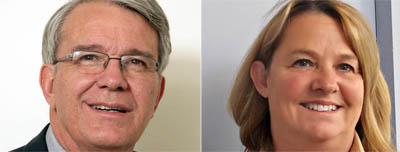Latest News Archive
Please select Category, Year, and then Month to display items
12 October 2020
|
Story Arina Engelbrecht
|
Photo Supplied
 Arina Engelbrecht from Organisational Development and Employee Well-being believes physical activity has a number of benefits for one’s health, including stress relief.
Arina Engelbrecht from Organisational Development and Employee Well-being believes physical activity has a number of benefits for one’s health, including stress relief.
Being physically active plays a big role in preventing the development of mental-health problems and in improving the quality of life of people experiencing mental-health problems.
Treatment for depression
Physical activity can be an alternative treatment for depression. It can be used as a stand-alone treatment or in combination with medication and/or psychological therapy. It promotes all kinds of changes in the brain, including neural growth, reduced inflammation, and new activity patterns are formed that promote feelings of calm and well-being. It releases endorphins – powerful chemicals in the brain that energise your spirit and make you feel good.
Physical activity can be very effective in relieving stress. Research in adults has found that physically active individuals tend to have lower stress levels compared to individuals who are less active. It also leads to improved sleep. When a person sleeps better and feels more rested, overall quality of life improves. They cope better with daily life stressors.
Reduce Alzheimer's risk
Regular physical activity can reduce your risk of developing Alzheimer's disease by up to 50%. It can also slow down further deterioration in those who have already started to develop cognitive problems. It stimulates the brain’s ability to maintain old connections as well as to make new ones.
A study asked people to rate their mood immediately after periods of physical activity (e.g. going for a walk/run, cycling, doing housework) and periods of inactivity (e.g. reading a book or watching television). Researchers found that participants felt more content, more awake, and calmer after being physically active compared to after periods of inactivity.
In conclusion, people who are physically active feel a sense of well-being, feel more energetic throughout the day, sleep better at night, have sharper memories, and feel more relaxed and positive about themselves and their lives.
“Being physically active not only changes your body, it changes your mind,
attitude, and your mood.” – Arina Engelbrecht
UFS welcomes two new deans in the faculties of Theology and Law
2014-08-04
 |
The university council has approved the appointment of two deans: Prof Fanie Snyman, at the Faculty of Theology and Prof Caroline Nicholson, at the Faculty of Law.
Both professors offer the university a wealth of knowledge and experience in research and teaching.
Prof Fanie Snyman
Prof Snyman joined the university in 1984 as a senior lecturer in the Department Old Testament. His career followed a steadfast ascent which led him to attaining the title of professor and head of department the following year. On 1 July 2013, Prof Snyman took on the additional role of acting dean of the faculty.
As dean, he set out a clear vision of academic leadership with four primary focus areas: research, teaching and learning, internationalisation and regional engagement.
He is the author of eight books and contributed to seven internationally- and twelve nationally-published books. He has published nine articles in international journals and about 60 more in accredited journals.
Prof Snyman proposes to bring staff members together to extensively rethink and reposition the faculty in terms of identity, transformation and the way forward. “We live in a complex world, characterised by uncertainty and in constant change. This calls for complex but also innovative solutions,” he says.
Prof Caroline Nicholson
Prof Caroline Nicholson was born in Scotland and came to South Africa as a young child. She obtained her BProc and LLB degrees at the University of the Witwatersrand and completed her articles of clerkship at Chernin’s in Hyde Park Corner, Johannesburg. Prof Nicholson was admitted as both an attorney and notary public of the then Supreme Court of South Africa in 1986.
In 1986 she joined the University of South Africa (UNISA ) as a lecturer and remained there until 1999. During this time she completed an LLM in Banking Law and an LLD in Comparative Conflict of Laws – focusing on international parental child abduction. During the same year she moved to the Faculty of Law at the University of Pretoria where she worked for the last fifteen years. In 2003 she completed a Postgraduate Diploma in Alternative Dispute Resolution (ADR) and has an abiding interest in ADR, especially within the Family Law context.
Prof Nicholson has produced numerous articles and research presentations on a variety of legal subjects. Her primary areas of interest are, however, legal education and child law. She is known both nationally and internationally for her research contributions.